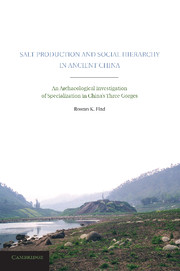 Salt Production and Social Hierarchy in Ancient China
Salt Production and Social Hierarchy in Ancient China Book contents
- Frontmatter
- Contents
- List of Figures and Tables
- Acknowledgments
- Prologue
- 1 Introduction
- 2 Production and Specialization in Complex Societies
- 3 Ancient Salt Production in Sichuan
- 4 The Zhongba Site
- 5 Ceramic Evidence
- 6 Parameters of Production According to Ceramics
- 7 Features and Spatiality
- 8 Animal Remains and Divination
- 9 Conclusions and Implications
- Epilogue
- Appendix A Chinese and Japanese Term List
- Appendix B The (t) Value and Average Thickness for Each Level Excavated in DT0202
- Appendix C Calculating the Scale of Production Using Briquetage from DT0202
- Appendix D Taxon List for Specimens Recovered from DT0202 with Number of Identified Specimens and Minimum Number of Individual Count by Phase and Subphase
- Notes
- Bibliography
- Index
8 - Animal Remains and Divination
Published online by Cambridge University Press: 07 September 2011
- Frontmatter
- Contents
- List of Figures and Tables
- Acknowledgments
- Prologue
- 1 Introduction
- 2 Production and Specialization in Complex Societies
- 3 Ancient Salt Production in Sichuan
- 4 The Zhongba Site
- 5 Ceramic Evidence
- 6 Parameters of Production According to Ceramics
- 7 Features and Spatiality
- 8 Animal Remains and Divination
- 9 Conclusions and Implications
- Epilogue
- Appendix A Chinese and Japanese Term List
- Appendix B The (t) Value and Average Thickness for Each Level Excavated in DT0202
- Appendix C Calculating the Scale of Production Using Briquetage from DT0202
- Appendix D Taxon List for Specimens Recovered from DT0202 with Number of Identified Specimens and Minimum Number of Individual Count by Phase and Subphase
- Notes
- Bibliography
- Index
Summary
Up to this point in the study of Zhongba salt production, I have focused on both direct and indirect evidence explicitly related to the organization of salt production itself. The ceramic remains discussed in and comprise the majority of the preserved tools used in salt manufacture and therefore provide substantial, albeit indirect, information regarding the salt-production process. The organization of physical space and the relationships among production features discussed in are direct evidence for certain aspects of the organization of production, such as concentration, and are also indicative of the intensity and context of the manufacturing process. Yet, to examine more fully the social context of salt production and construct a complete picture of activities that took place in and around the production area, we need to examine aspects of the material record that are indicative less obviously of the organization of salt production but that illuminate the complex system of intersecting activities that occurred at the site.
Perhaps the most significant such data from the Zhongba excavations are the animal bones that we recovered from the main production zone. These faunal remains are useful particularly as a means to approach questions concerning the subsistence base of the salt producers at Zhongba and also may reveal one of the primary uses to which salt produced at the site may have been put: meat and fish preservation. In addition, animal bones used in divination have been found in the production area, and I suggest that these remains indicate both the importance of salt production to the people of Zhongba and some degree of control over the production process by a segment of society that had exclusive control over ritual knowledge and divinatory ability.
- Type
- Chapter
- Information
- Salt Production and Social Hierarchy in Ancient ChinaAn Archaeological Investigation of Specialization in China's Three Gorges, pp. 173 - 219Publisher: Cambridge University PressPrint publication year: 2011


